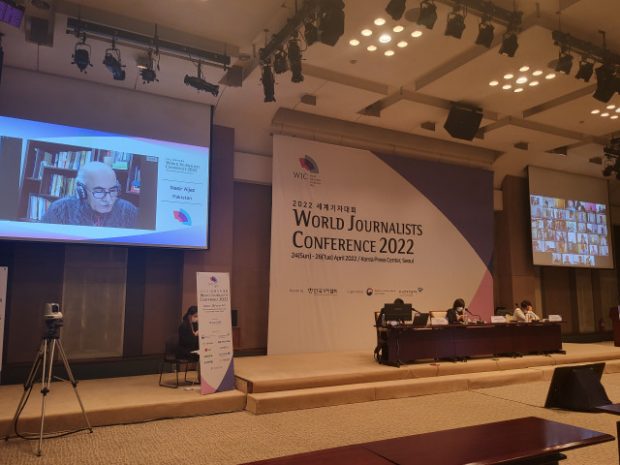We have to reset our mindset

Nasir Aijaz addressing WJC2022
Text of the speech delivered by Nasir Aijaz, Chief Editor, Sindh Courier, Karachi, Pakistan, at the World Journalists Conference (WJC 2022)By Nasir AijazChief EditorSindh Courier, Karachi, PakistanKARACHI: We have gathered today to discuss ‘Current Status of Fact-Checking by Global Journalism and the Operation of Media Self-regulatory Organization’.
The topic chosen by JAK for the World Journalists Conference 2022 is not only important but very interesting also, as the fact-check and self-regulation through Code of Ethics for making a report authentic and accurate, had been the basic lesson of journalism, yet we need to discuss it even today, being turning more complex with every passing day.Perhaps we have failed to find any workable solution, as the issue has become complicated with emergence of social media – a powerful weapon possessed by every citizen.The Internet has a complex infrastructure and technology which enables users to access and exchange information globally.Today approximately 2.5 billion people worldwide are connected through the Internet, which has become a great source of dissemination of information, not only by the journalists but every user having access to Internet.Prior to advent of Internet and the social media, there used to be a fact-check system in print as well as in electronic media.As the print and electronic media were considered as ‘Gateway to Information’, any report filed by the reporters, was to be checked thoroughly before publishing or telecasting/broadcasting, but the social media smashed all such systems and turned to be an ‘Unguarded Gateway’ from where any information passes without any hindrance and nobody is able to verify whether it’s fake or authentic.In most cases, the journalists greatly depend on such unascertained information.Since the digitalization has greatly increased the amount of information, prompting the governments to control that data, the situation has become more complicated, as the restrictions through certain laws are being considered as an assault on basic right to express views.Here I must share that such a situation prevails in Pakistan where the government has drafted a new law to setup ‘Pakistan Media Regularity Authority’.The controversial law proposes placing all media including print, broadcast and social media under the jurisdiction of one regulatory agency.Rejected by all the media owners and journalists’ bodies as well as rights organization terming it as “draconian” and ‘unconstitutional’, the proposed law also envisage jail term for the journalists.In fact the digitalization not only has changed the way people communicate, it has transformed profoundly and irreversibly the nature of journalism and ethics.While new media encourages people to speak their minds, it still needs independent journalists to provide reliable and impartial news and analysis.Here begins the crucial task of self-regulatory mechanisms to foster public trust in the media, otherwise ‘all information would be considered guilty, until proven innocent’, as an author A. D. Aliwat suggests.The widespread availability of content deemed harmful has inspired concern as there is no common understanding of the rules that should internationally govern the Internet.Hence self-regulation appears to be a solution to increase online accountability while offering more flexibility than state regulation.With new technologies radically reshaping the media landscape, traditional regulatory assumptions have been called into question and, in many cases, existing rules have become counterproductive and the governmental regulations proved to be efficient.This issue is still very much debated.There has not yet been a common agreement reached on people’s rights and responsibilities on the Internet.In my view, self-regulation can help preserve the independence of media and protect it from government interference.I must clarify that self-regulation is not censorship and not even self-censorship.It is about establishing minimum principles on ethics, accuracy, and so on, while fully preserving editorial freedom on what to report and what opinions to express.I must say that the journalism is not a free speech.Rather it is constrained expression, and it works in a framework of values and ethics, in framework of professional standards given in the Press Code/Code of Ethics for journalists.Journalism has public purpose and it has to be done in public interest.We all know that publicly expressed criticism will always be perceived as incorrect by those scrutinized.However, self-regulation helps the media respond to legitimate complaints, and correct mistakes in a trial-and-error way.By promoting standards, self-regulation helps maintain the media’s credibility with the public.At the same time, self-regulation protects the right of journalists to be independent, and to be judged for professional mistakes not by those in power but by their colleagues.On the other hand, the constitutions should prohibit censorship and protect freedom of expression; the Laws should guarantee free access to government information and protect journalists from being forced to disclose confidential sources of investigative stories; the regulations should guarantee the fair and transparent administration of media business such as registration, licensing etc.A self-regulated media can fight more effectively for the repeal of unnecessary regulations by convincing the public that the media are conscious of the need for standards.Governments can best promote self-regulation by: Saying no to state ownership of the media; Ensuring full freedom from governmental interference in the press; Keeping the media pluralistic through anti-monopoly measures.We all also are well aware that neither good laws nor ethics will ever fully satisfy the public about what the media do, but the responsible self-regulation is the way to move in the right direction.What we have to do is to reset our mindset.










































